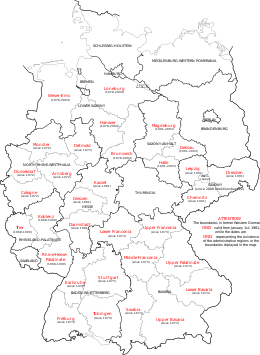
Back Regierungsbezirk ALS Regierungsbezirk AN منطقة إدارية ألمانية Arabic İnzibati dairə (Almaniya) Azerbaijani Regiarungsbeziak BAR Адміністрацыйная акруга (Германія) Byelorussian Regierungsbezirk Catalan Vládní obvod Czech Административлă тăрăх (Германи) CV Regierungsbezirk Danish


| This article is part of a series on the |
| Politics of Germany |
|---|
 |
A Regierungsbezirk (German pronunciation: [ʁeˈɡiːʁʊŋsbəˌtsɪʁk] ) means "governmental district" and is a type of administrative division in Germany. Currently, four of sixteen Bundesländer (states of Germany) are split into Regierungsbezirke. Beneath these are rural and urban districts
Regierungsbezirke (pronounced [ʁeˈɡiːʁʊŋsbəˌt͡sɪʁkə] ) serve as regional mid-level local government units in four of Germany's sixteen federal states: Baden-Württemberg, Bavaria, Hesse and North Rhine-Westphalia. Each of the nineteen Regierungsbezirke features a non-legislative governing body called a Regierungspräsidium (governing presidium) or Bezirksregierung (district government) headed by a Regierungspräsident (governing president), concerned mostly with administrative decisions on a local level for districts within its jurisdiction.[1] Saxony has Direktionsbezirke (directorate districts) with more responsibilities shifted from the state parliament.